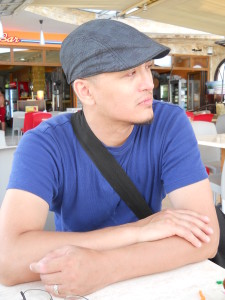Contributed by one of our Anthology authors, Ben Efsaneyim
[Note: in the Anthology, Ben wrote What a Difference a Word Makes and we inadvertently misspelled Ben’s last name as Efsanem. Ah, what a difference two letters can make! Sorry, Ben, and thank you for writing your novel so we now have this opportunity to correct our error.]
Nothing into Something: The Legend of Fu
It is a bizarre paradox to consider that nothing – i.e. the absence of a thing or anything – could serve as an inspiration for a novel. Yet, as I began to learn more about the story of the first Chinese migration to America, I came to realize that the rich history of these primary waves of migrants has lacked an American cultural narrative. As I delved deeper into this history, I came to realize that there was a very good reason why America has chosen to forget.
As soon as the first Chinese immigrants began to arrive on the West Coast in the mid-nineteenth century, hostility towards their presence began to emerge. Over the ensuing decades, a campaign of hatred was waged against them that can easily be described as an ethnic cleansing. More than seven decades of an Asian migrant group’s history has effectively been erased. This absence of a cultural narrative is what prompted me to write The Legend Of Fu.
Our culture abounds with stories of Wild West heroes engaged in dramatic duels with gun-slinging outlaws, hardy pioneers who braved attacks from Natives to build new lives, and grizzly beast-men, both terrifying and adored for their ruddy tenacity in the wild, wild wilderness. By contrast, the bravery, tenacity, hardiness, and heroism of Chinese migrants beset by violence, as well as social and political exclusion, are missing from cultural narratives describing the period. The Legend Of Fu interweaves factual incidences of mob violence and anti-Chinese racism to show how the power of racial stereotyping defines an ethnic minority so that society’s engagement with them is based solely on these racist beliefs.
The demonization of Asian men constitutes the other major theme in the book. The novel re-frames the idea of the Asian arch-villain. The main protagonist, Fu, is fundamentally an arch-villain in the eyes of society but an arch-philanthropist in truth. He is an “anti-Fu Manchu” if you will, albeit set in story with the awkward reality of anti-Chinese racism added to the mix. In the stock stereotype, such Asian villains possess a dastardly supernatural power that aids them in their efforts to undermine Western civilization, all conducted from an underground secret lair in the exotic hell-hole of Chinatown. But such stereotyping does not allow for the possibility (and in the story, the reality) that Fu’s mystical connection can actually be a force for good.
Colleen, the other main character in the novel, is a white woman whose secrets from her past drive the action in the story. Through her character, I sought to glimpse the psyche of the white mainstream that persecuted the Chinese and to suggest that racial stereotypes are merely the worst aspects that a society refuses to see in itself and instead projects onto the Other.
The book is a fast-paced action thriller, set in 19th century San Francisco’s Chinatown, that follows the fortunes of Fu as he survives the brutality of a coolie ship, escapes to Mexico, and finally makes his way to America with his childhood friend, Gan. As a successful merchant and philanthropist, he inadvertently rescues Colleen from a brothel and immediately finds himself in the middle of an escalating intrigue. When a thousands-strong mob descends on Chinatown, Fu, Colleen, and his companions work feverishly to solve a mystery that could stave off their destruction. Amidst the real-time plot, the undercurrent of anti-Chinese racism and its resulting violence pervades the lives of the characters. Background stories are told in flashback, contextualizing the actions, thoughts and motivations of the main characters.
I pulled no punches with the depictions of the brutal persecution inflicted by white mobs, nor with the language used to dehumanize the Chinese. This was not done for shock value but simply as a genuine recounting of the events that inspired the novel.
History and historical experience are the foundations of identity. The Asian American narrative from this period is absent, meaning that all the heroic “founding fathers” of Asian America whose tenacity and bravery forged the basis of subsequent Asian migrations have not been given a voice in the tapestry of the American narrative.
In writing his book, I hope to achieve a realistic and accurate retelling of historical facts in a dramatized setting, devoid of the need to compromise truth.
For a more detailed book interview
The Legend of Fu is available for purchase
Rave reviews from readers

Bio: Ben is a writer who has lived in Istanbul, Turkey, with his wife and son since 2007. He has a Fine Arts background and studies and writes about Asian-American issues. He blogs, is passionate about playing the guitar, and draws and paints for pleasure. He is overly modest about his extensive knowledge of wines and regularly thrills his family with his cooking. The Legend of Fu is his first novel.
